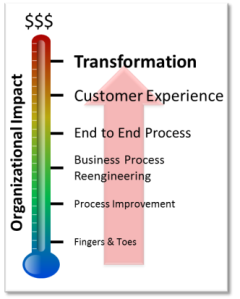As the old saying goes, “success breeds success” creating new knowledge and changes along the way. And the experimentation cycle continues for everyone. However, for many this path has not been and is still not painless.
But we have learned! Many companies have matured in their use and their understanding of how BPM and BPMS enabled BPM can be used – and today they push the boundaries of traditional BPMS concepts in looking for business support.
Along with this evolution in use, many companies have realized that BPMS enabled BPM projects require a different type of governance and direction than past business or IT projects have required. This realization is the foundation for the creation of BPM CoEs. These CoE’s are built in part on the positive legacy that comes from decades of investments in Six Sigma, LEAN, and traditional business reengineering. Supporting technology has also matured and has taken these disciples to new levels of capability - with iBPMS being the latest and most notable.
What should companies be doing with BPM?
There is no single answer to how companies today envision the role and capabilities of BPM and BPMS enabled BPM. That is part of the problem. I believe that this lack of a uniform vision for BPM support is based on a lack of understanding as to what it can really deliver and how it could be used in a company. Today there is a tremendous variation of the types of projects, and the level of impact that BPM CoE’s are having on the business. This variation makes it challenging to clearly define what leadership should be expecting from their BPM investments.
|  |
To help answer this question, consider that BPMS supported BPM can be used to effectively regenerate most of your legacy applications – moving them into modern technology and expanded capability, not to mention updating and upgrading them at the same time. But here caution should be used. I believe that basic business operation systems should be licensed for things like financial, HR, legal and other support that will give little competitive advantage, but are “must haves”. There are also general purpose applications that you may want to move to a shared services vendor.
However, those applications that provide a competitive advantage or help you actually manage a business operation form a different category of systems and I believe should be custom generated or built, and closely maintained in-house. The reason is that they give your company an advantage and thus make it more competitive. They may also contain sensitive company pricing and other information. These applications will often not be the largest, but aside from those that support legislative requirements, they are the most critical ones. They are also the ones that tie most closely to business operations that support the customer and which, when operational, can have the biggest impact on the ability of the business operation to generate revenue.
The business designs that drive this custom built class of application support are the true focus of the BPM CoE and the efforts to improve the business operation. The ability of any company to build/generate, enhance/change the business operation and the work these applications provide is the most important contribution of BPM and BPMS enabled BPM. The reason is that they are the foundation for effective and efficient operation and the ability to change them fast and at low cost is the key to remaining truly competitive.
Delivering this ability to change these business functions and their application support is the role of any BPM CoE. It is what will eventually prove to be most important in the ongoing success of the business.











0 comments:
Post a Comment